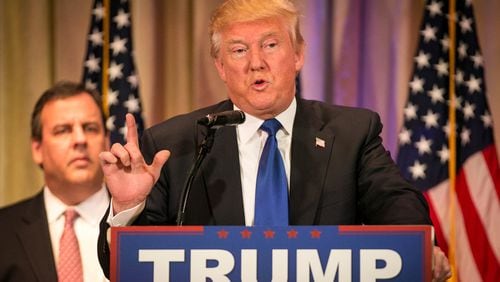As GOP candidate Donald Trump continues to rack up delegates in primaries and caucuses, those who feel the New York billionaire does not represent the party of Lincoln are becoming more vocal about ways to derail his potential nomination.
While Sen. Ted Cruz, (R-Texas), asked his fellow candidates to prayerfully consider leaving the race to give his campaign an advantage, a mass exodus prior to the next “super” primary day on March 15 seems unlikely. (Though it appears to have narrowed by one with Ben Carson’s announcement that he would drop out.)
Talk from some party members has centered on a plan that would keep Trump from getting the requisite number of delegates prior to the July nominating convention, pushing the process into something called a contested, or“brokered,” convention.
Sen. Lindsey Graham, (R-S.C.), told CNN that a brokered convention would be unfair to Trump. Graham, who is no Trump supporter, told CNN’s David Axelrod, that ...
"If he (Trump) got two thirds of what he needs, which I think he's well on his way to doing, for us to steal from him is not going to help the party. You can lose an election. We've lost an election before. But what I'm trying to do is focus on the day after we lose. Can we rebuild this party? Can we create a form of conservatism that's enticing to young people and people of color? I think we can. And I think that's the only hope for the Republican Party and, quite frankly, one of the big hopes of this country."
Former Republican National Committee Chairman Michael Steele, says he can see a path to a brokered convention – despite the fact it would be the first one for either party in 64 years.
"Whether or not it comes to fruition, there's still some fight left. There's some, again, battles to be won this coming week … You've got the big fight the following week, that's Florida and the winner take all states. But yeah, I think there is a real possibility," Steele told a Philadelphia television station.
So what are they talking about when they say the convention could be brokered? Here’s a quick look at how it works.
What is a contested, or "brokered," convention?
A contested convention happens when no candidate running for a party’s presidential nomination has the majority of delegates needed to secure the nomination.
In the case of the Republicans in 2016, the number of delegates needed to win the nomination is 1,237 of 2,472 delegates.
A brokered convention refers to the idea that power "brokers" in the party -- such sas state party chairmen -- would help resolve a contested convention by directing delegates how to vote afte the first ballot.
What happens at a contested/brokered convention?
First, a vote is taken. After the vote – or first ballot as it is called – if no candidate has the number of delegates needed to win the party’s nomination, the convention is considered brokered. That means that all the delegates won by the candidates during the primaries and caucuses are now free to vote for whom they want, and are no longer “bound” to the candidate who won the popular vote in the state they represent.
Then what?
After the delegates are freed to vote for whom they want to, another ballot is taken. If no majority is arrived at on that ballot, then delegates continue to vote until someone gets the required number of delegates to win the nomination. In between those votes, delegates can be wooed by those supporting other candidates to vote for their man or woman.
How do superdelegates factor into the mix?
Superdelegates, or delegates who are not "bound" to a certain candidate and can vote for any candidate they wish, are counted along with regular delegates on the first ballot.
Does this happen often?
It used to, but not much anymore. The Democrats had brokered conventions from 1844 until 1936 (in 1924, the Democrats went through 103 ballots before getting a nominee. He lost in the general election.) Generally, both Democratic and Republican front-runners will have the needed delegates well in advance of the convention.
When was the last one?
The last one was in 1952 when it took three ballots to nominate Illinois Governor Adlai Stevenson as the Democratic nominee. For Republicans, it was 1948 and Thomas Dewey was nominated after three ballots.
Realclear Politics reported in a story in December that the closest the Republicans have come in recent times was the 1976 convention when Ronald Reagan tried to block Gerald Ford's nomination. Ford was nominated and lost the election to Jimmy Carter.
What happens to the delegates of a candidate who has dropped out of the race?
For Republicans, it depends on the state the delegates come from. Rules for some states require that a delegate vote for the candidate they were bound to – at least for the first ballot. Some states allow for delegates to immediately pledge for another candidate. For Democrats, the delegates are divided among the remaining candidates.

